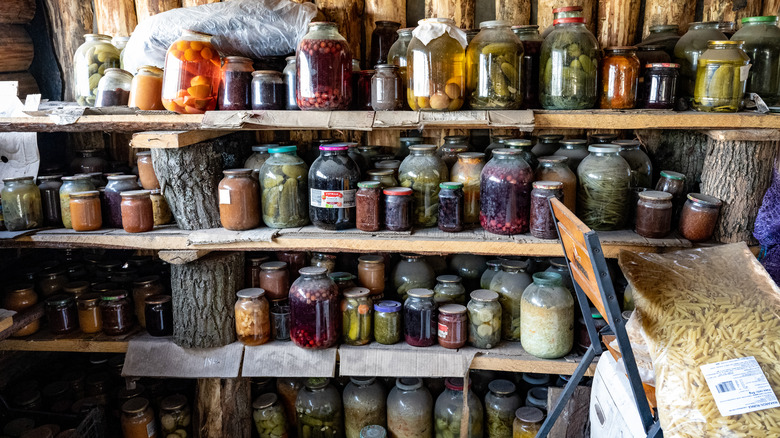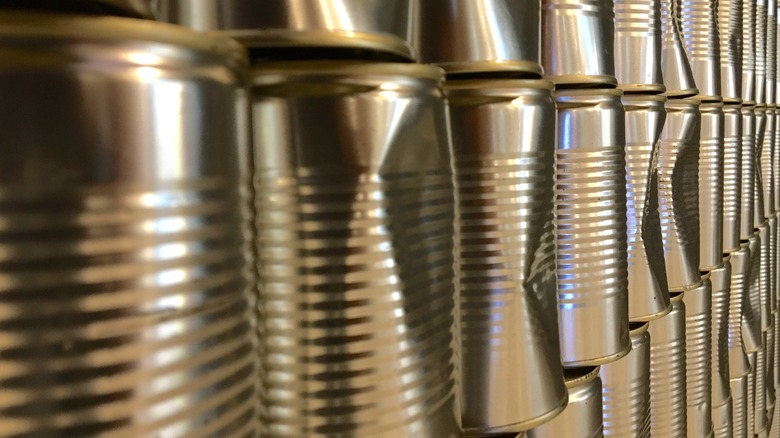How Long You Can Safely Store Canned Food, According To The USDA
With as many as 98% of the population keeping canned food in their kitchen, it's important to know how long you can keep canned goods in storage before they go rancid (via USA Today). According to the U.S. Department of Agriculture (USDA), canned food can last indefinitely when proper canning procedures are followed.
If you've ever wondered why the canning process enables food to last so long, the explanation is pretty straightforward. Canned food comes sealed in airtight containers, preventing bacteria from growing and causing food spoilage. Essentially, as long as air hasn't made its way into your jar or can, you can eat the food inside it even years after you bought it.
But what if your canned food has already made it past the date on the label? Fortunately, by following proper storage techniques, you can not only extend the shelf life of your canned food, but also preserve their taste.
Understand the best by date for canned food
Though canned food can theoretically be stored indefinitely, the best by date stamped on it stipulates the timeframe within which the food retains the quality of its taste and texture.
Per the USDA, foods that are highly acidic in nature, like canned tomatoes, are best eaten within 18 months. Low-acid foods can last even longer, with a shelf life of about five years. While that doesn't necessarily mean that the food will no longer be fit for consumption beyond those dates, the quality will certainly change.
As former food scientist Dana Gunders told Today, "The idea that there's a magic date when foods all of a sudden 'expire' is a myth." She explains that shelf life is determined via internal evaluations of how long the food can keep its taste and texture. Meanwhile, quality assurance director Ron Giles explained that these processes involve comparing newly produced products to older samples in terms of appearance, taste, and texture. So, the date you see is more of a well-researched estimate.
How to stash your canned goods properly
If you plan to stock up your pantry with enough canned food to last, say, a decade, make sure that your storage conditions are ideal in order to preserve their quality.
According to the University of Minnesota Extension, the storage area for your canned food needs to be cool, dry, and clean. Humidity and excess moisture can be the death of your cans, as they can lead to rusting and deterioration. Avoid storing your canned food in a damp place, or near water pipes or moisture. Additionally, the temperature in your storage area should ideally be between 50 and 70 degrees.
Utah State University suggests keeping your canned goods off the floor, especially concrete floors, since moisture can seep through and promote rusting. Lastly, consider rotating your canned food as you add new finds to your stash, to ensure that your oldest stock gets consumed first.
Know when it's time to throw your canned goods away
Different factors, including rust, dents, or breakage, can allow bacteria to enter your canned food and cause spoilage. In such situations, you'll definitely want to toss your canned food. According to the Centers for Disease Control and Prevention, the toxin produced by bacteria in your canned food can cause botulism, a dangerous and even potentially fatal illness.
Be on the lookout for swollen or leaking cans, according to the National Center for Home Food Preservation. Even if the swollen cans look sealed, don't risk it; just bag them and throw them away. As for leaking cans, they must undergo a detoxification process (which involves boiling them for 30 minutes) before you dispose of them. Be sure to wear gloves while you're doing this, because the botulism toxin can still harm you if you accidentally ingest it or if it enters your body through any cracks in your skin. Lastly, disinfect the area after you're done.




